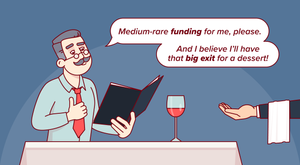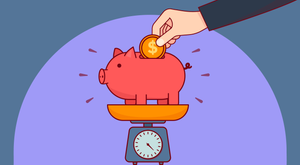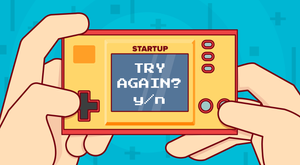Find this helpful?
This is just a small sample! Register to unlock our in-depth courses, hundreds of video courses, and a library of playbooks and articles to grow your startup fast. Let us Let us show you!
Submission confirms agreement to our Terms of Service and Privacy Policy.
Already a member? Login
AI Generated Transcript
Ryan Rutan: Welcome back to another episode of the Startup therapy podcast. This is Ryan Rotan from startups dot com, joined by my friend, the founder and CEO of startups dot com. Will Schroeder, will we talk about founders and what it takes to be successful? And we talk about a lot of people we know who've had success. Um And they've just done it over and over and over and on repeat, right? Isn't that how this works? Like once you've done it right? Once you just keep doing it and just like you just keep getting it right over and over again. Yeah.
Wil Schroter: Uh No. Damn. If, if you show me a founder that's been successful in their career, I'll show you one thing they did, right? And probably not too and probably not too. I think we've got this myth that founders who've been successful. Number one, start off successful and keep being successful. We always hear the tired trope of. I started from the bottom and then I had to fight my way through and eventually I made it became like we get that all founders have that story. But beyond that, what we don't really tend to hear or take away from this story. And I think we should talk about today is how most founders in the span of their career. And let's talk about a 30 to 50 year career 30. If you retired early 50 if you're just everybody else probably did one thing. Had that one moment. That was the make or break for the rest of their career. Yep.
Ryan Rutan: That hockey stick moment,
Wil Schroter: that hockey stick moment. And I think, you know, what we'll talk about is how many of those moments do we even have? Do we know those moments are going to exist when they're about to come up and beyond that, how do I know this is the moment?
Ryan Rutan: That's the thing because even in the moment, sometimes as it's happening, it's not clear that this is actually the inflection point. You know, it's, it's a way to change thing. Sometimes it's, you know, sometimes it's over the course of an entire year that whatever it is happens, happens the entire course of a year, which is actually a blip in terms of your entire career. But, you know, if, if something changes over the course of an entire year, it's like when you see a friend, once a year and you see their kids, once a year, there's a big change in between each time you see them. But, you know, when with your own kids, you're watching them grow, you know, you know, minute amounts every day the, the change isn't as apparent until Facebook reminds you how old you are with photos from your past. So, yeah, I, I think that it is important to note that these things aren't always obvious. In fact, rarely, are they obvious that you're entering into this moment? I don't know that I've ever talked to a founder who's like, I think I'm about to hit my inflection point and then it actually happened. I've definitely heard people say that it was usually followed by absolute flat line. They're like, this is it. We've found it. We've struck, you know, we've got lightning in a bottle here. This is it. And then nothing much changes. Right? And not to say that things won't change later. But like, it wasn't that moment.
Wil Schroter: It's funny you should say that because until you're articulating that way, I didn't really think about it every time I thought it was that moment, like, oh, clearly, this is, it ended up being such a massive disappointment. Like, like at an almost brutal level. Right. Well,
Ryan Rutan: a picture of Babe Bruce pointing at the left field wall, right. And then just like losing the grip on the bat and like taking out the first baseman with it instead, that's, it's a way different ending, right? Than calling your shot and hitting that home run. That's what it feels like. Right. You just, you, you just announce to whoever, even if it's just to yourself. This is about to happen. We got it. I finally fought all the fights, beat all the bosses, the teams in place, the products in place. We know everything we're gonna do and it just doesn't change as much as we thought it was going to.
Wil Schroter: Well, right. I guess, you know, the, the way I see it too is in our minds, we spend so much time trying to build up to this moment. So it's kind of hard to believe that we would spend all this time trying to build up to a moment and not have the moment come. Right. It's like building that Lego toy for your kids. And at the end of the last page, you put the last brick on and you're nowhere near, you realize you're, you're at book one of 6000, right?
Ryan Rutan: Yeah, I was gonna say I, I have, I have all of the startup lego kits that exist and actually none of them came with instructions for what you're supposed to build. Like not even a picture on the box of what it should look like at the end. That's, that's the problem they
Wil Schroter: turned into very poorly built models. Um And so I think what we should talk about, let's open up with this. Let's open up with just how many shots do I even have. So part of that is we all think it's just this one shot. I just raised money. I just had an idea, et cetera. This is my shot, which is, which could be true. I mean, for what you want to do, you may run this thing, it may go out of business and then maybe the last time you ever do a startup again, the problem is we don't know, but we all think it's this one shot in your mind. If you think about how many shots a startup actually has or a person actually has. How do you think about that? Like, if you're a consoling a founder? Yeah,
Ryan Rutan: I mean, we've, we've talked about this before, which is that like a big part of this is just being around long enough, right? Just making sure that we get to keep going, right. Setting that setting that runway off to the vanishing point so that we never have to worry about hitting it so that we're around long enough. So I think that there's such an interesting paradox here in that we have the ability to take lots and lots and lots of shots if we set it up. Right. And of course, we kind of have to believe that, you know, not every shot we're taking, not every little action that we're doing, you know, I don't assume that the, you know, the piece that I penned this morning is the inflection point, right? It's part of the overall thing we're building that leads to that, but that's one of a, a little shot. But let's talk about, you know, if we're talking about the, the bigger shots, like the big plays, the big hires, the product changes, the pivots if you'll, if you'll pardon the term, those things, there's such an interesting paradox there in that, like, we can take a lot of them and we have to believe that they're going to have an impact, but we don't necessarily know which one it is, that's going to get us there. And here's the paradox. We only need one. We only have to be right that one time, as you said, we just got to get it right. The once create that inflection and then, and then we're off to the races. So there's this weird imbalance between the amount of inputs that it takes and the number of outcomes that it actually creates. And the maddening part of this is that we're never quite sure which one's gonna be the one, right.
Wil Schroter: Agreed. Agreed. Let's add, let's add a couple other pieces to this. Let's add perspective how much time you've had on the planet to understand how many shots you do or don't have. I'll give you an example. When we're in high school. We think every single thing that's happening to us at the time is such a, a life ending moment. If we don't get asked to prom, it's like our whole lives will end, right? My, my son will, is six years old. What I love what something he says all the time. He always references things like back when I was a kid and I used to do this, right. We talked about last year. It's such a beautiful reminder that his entire perspective of the world is less than six years. I mean, think about how many cognitive years he actually has in there. Um And so he looks at last year as being like this whole massive epic in his life. Now you stretch that out and you go into, into our adult careers and, and let's, let's reset because we've talked about this. Let's move to, I'm 25 years old and I'm like, I have to hit it here because if I
Ryan Rutan: don't, I'm a quarter of a century old, right?
Wil Schroter: But three years into your professional career, that's sort of what we're starting to talk about when you haven't been on the planet long enough as a professional. I'm not talking about as a human, as a professional and you're 35, 10 years into your career, you don't have perspective yet. You don't yet understand that you have lots and lots and lots of shots on goal. And by the way, the one you're taking now might be the shittiest effort you're ever gonna have. That's
Ryan Rutan: that, it's such a big part of it. I think we touched on this in the last episode. But in the context of starting over, I mean, we're talking about like, what happens, how big of a failure can I come back from what I have to start all the way over in the same way with each new shot that we take within a given startup. I'm not talking about having to start over. Now I'm saying like just as we continue running these businesses, at least in theory, every shot that we take should have a little more information behind. It should have a little bit more of that perspective. A little more of that knowledge, a little more of that experience, a little bit more understanding of why the last shot was wide of the mark, right? Not always, sometimes it's just not clear at all why we miss. It's like everything lined up. And again, this is why we call those shots. We're like, this is the moment, this is the inflection point. This is where it all happens and then we whiff and we don't necessarily understand why because from every bit of information that we had in that moment, this was it right. We were going to be able to accomplish whatever it was that we thought was about to happen and it just doesn't happen. But by virtue of being around, by virtue of taking the shots, we should be moving closer and closer towards it. Now, it it's not a foregone conclusion and sometimes luck is involved market conditions. There's lots of things that impact this, but you know, it was since we're talking shots and I've already said the word hockey stick Wayne Gretzky said, you know, I miss 100% of the shots I don't take. Right. And so there is a, a huge importance here to maintaining that effort and maintaining it under conditions where, you know, that there's just not going to be certainty that this stacks up. Right. This isn't building a brick wall. It's not like, just because I keep going, I keep doing, I'm eventually going to get the result I want. Sadly. No. Right. Right. There, there are plenty of people who set out to sell a company for $5 billion. There's very few people who have actually done that.
Wil Schroter: But here's the best part, all the people that have done it had no idea that this was going to be it. Now, we tend to rewrite history, right? You get those people that are on the conference circuit talking about or on their podcast now, right? How I built this film like that and they're talking about that origin story and kind of the confidence they had this. Here's the
Ryan Rutan: linear path I used to build this.
Wil Schroter: It makes great fiction. It makes great stories, right? And if you're gonna tell that whole story in a 45 minute podcast, I bet it's entertaining as hell. But guess what, I've lived that story. It's not that entertaining,
Ryan Rutan: entertaining and it's not linear and it horrible story, the more downside than,
Wil Schroter: but all along the way, the one key element that we're talking about here is we never knew which one was gonna be our shot and often what looked like our shot never worked out to be what it was. I'll give you an example when we took our agency in 1997 and we merged it with another agency from across town that other agency had been around for 20 years. The partners at the time were in their mid to late forties, old guys. Right. And, and, and their hope and their dream at the time. Watch it. Yeah. Right. Right. Their dream at the time was that if they could all retire by 55 with some at the time would have been a very small amount of cash. They would have been very happy and, and I always thought that was amazing and I was, you know, rooting for them. There's no way they could have possibly known that in that same year when they were like seven years from retirement thinking like this is pretty much what it is because we've been working on this agency for 20 years. Not to mention all the stuff we did before that, that like a year later, we, we'd win a quarter billion dollar a year account, right? I mean, to put that in perspective, right? Like nobody saw that coming, nobody saw it coming. And when I talk to founders who've had that moment, it's everything we keep describing when the moment came, they never knew it was gonna happen. They'd hoped it would happen. They'd worked toward it, but none of them knew that that was the moment. Conversely when things went south, they didn't know that was the moment either. This is this really weird thing. And I think that's where, where you're headed. This is not a sequential process, but we're used to sequential processes. Right. Our whole life is based on sequential processes we're built on, here's the formula for achievement. You know, we start in kindergarten, we finish in 12th grade. If we're fortunate, we go to college beyond that, we get a shitty job. We start and to hopefully work up to a better job. It is a very obvious pattern that we're used to. Here's the difference. If entrepreneurship, if being a founder were like being in school, we'd go through kindergarten, we'd tough it out. We'd get to 12th grade, fuck up 12th grade and be back in kindergarten and have to start all over again and then sometimes make it to fifth grade, then get kicked back, sometimes make it to eighth grade and get kicked back. We do not think like that. We actually don't believe that the world can work like that. Get that exactly how this
Ryan Rutan: works. Exactly how startup world works. Yeah. Right. And I think that's, you know, it's, it's not sequential. We don't know when the winds are coming to your point. Like, you know, you got this company that's been around for 20 years without even any real hope, maybe that anything like that was gonna happen or aspiration. But what they did do was stay around long enough to be able to take the shots and certainly they worked hard to create the conditions. So when the shot came, they could take it. Right. I think that's the other thing that we, we have to keep in mind that as we're conditioning ourselves, as founders, as we're conditioning our businesses and our teams and our products, we have to keep all of this in mind, right? We need to be ready for these moments because they're not sequential. They're not obvious, you know, there's ups and there's downs. I mean, you know, we, we've, we've certainly had them in our careers. We've had them at startups dot com. We've tried things that have worked amazingly well. We've tried things that haven't worked at all and we were relatively sure of the outcomes of both of those things at the time. Right. Like you just, you don't know until you try in this space. The beauty is that you get to keep trying. Right? Unlike a lot of other things where failure in career can be absolute. Right? And if you take the wrong foot as a podiatrist, it tends to be uh game over, right. You don't get to come back and do that again, you know, but in this space, you know, we can make big mistakes with our product and and we get to do it again and again and again, right, like you said, we might have to go back to kindergarten, but we have that privilege. We get to
Wil Schroter: do that, you know, something that's really funny about everything we talk about here is that none of it is new. Everything you're dealing with right now has been done 1000 times before you, which means the answer already exists. You may just not know it, but that's ok. That's kind of what we're here to do. We talk about this stuff on the show, but we actually solve these problems all day long at groups dot startups dot com. So if any of this sounds familiar, stop guessing about what to do. Let us just give you the answers to the test and be done with it. Let's play that out. So let's, let's make it relevant to some of the folks that are listening that are wondering if this is their moment. Here's a way to think about it, let's say in your twenties and you haven't had any other moments like this is kind of it. It's your first, you know, shot on goal in life and you raise some money and you're like, hey, you know, this is gonna be great. I've seen other people in their twenties do it, et cetera. Now you have the benefit of if this doesn't work out the whole rest of your life to do it again. Let's fast forward. You're now in your thirties, maybe some of the, the, the swings you took in your twenties didn't work out, or maybe you didn't take any relative to being a startup. Maybe this is your first time in the startup game and you're like, ah, you know, I really hope it works out a couple things. Number one, you're still not at the height of your income earning potential. I think people in, in tech have a, a very distorted view of all this. We tend to think that if, if we don't make it by 35 we're some kind of dinosaur and it's a wildly immature view of how the world works, basically exacerbated by people who tend to be very immature. Right? So these things tend, tend to, tend to build themselves. But what we'll find is by the time we burn through our thirties, we may find that in our forties, that's our year. Now, from a hiring perspective, forties tend to be our highest earning years because we're young enough, but old enough to kind of do very things that young person that gets nominated to become the president ceo, et cetera. That's kind of what people are looking for, people with the experience, et cetera. And that's sort of gone down to the thirties, et cetera, but that's here nor there point is a whole other decade where you can take that shot and make it. Now, when we get on the other side of 40 when you get to 50 and 60 things change a bit because at that point, you know, we're starting to say, wow, there's some consequences here that if I don't get it. Right. You know, I have fewer and fewer opportunities to make up for it. But the point is we have decades, whole decades, which whole companies get formed in decades, every major company that's ever gone public did it within a decade to give an idea of what can be done in a decade, right? You probably have about five of them. Get it right. You only need
Ryan Rutan: one of them and that's assuming that you spend an entire decade on each one before it flames out and you restart, right? Like highly unlikely, right? Got to year 10 again on my 4th 1, 40 years into this, still waiting for my shot and then look that does happen, it does happen. It also we, we wanna be careful here not to imply that nothing good happened along the way that these are somehow like impoverished, depressed founders who are just struggling and waiting for that shot that they never seem to hit. That's not the case at all. Right. I, I know plenty of founders who run businesses for externally might look like it was well past the point of no return. It's like, what, why are you still doing this and they're still enjoying it? They're making enough money that they're, you know that it's working for them and they're sticking it out and they're saying, like, look, I still believe in this, you know, maybe it's false optimism, maybe it's, you know, foolhardy or whatever, but they're still able to keep doing it. And again, some of those eventually turn into something else, but at a bare minimum, if they're enjoying doing it and they're making ends meet while doing it and they're there to take those shots. What's wrong with that? Right? Even that is an ok outcome.
Wil Schroter: Well, it could also be the goal but let's talk about kind of this only, you know, if you're only right once, what does that even mean? Only right? At what and what is the outcome? So in one of the first episodes we ever did of startup therapy and back in the early days, this is my son talking about it back when we were a kid, like, you
Ryan Rutan: know, back when will was a kid,
Wil Schroter: we had an episode that said something effective, $250,000 changes everything, right? And, and we talked about the merits of making $250,000. When we talk about, you only have to be right once we're not talking about and you go on to make a billion dollars. What we're saying is that you only need to be right once, means you only have to have maybe one but maybe a few seminal moments in your career. That fundamentally change your trajectory, fundamentally change your outlook, your capabilities, your connections, et cetera. I'll give you an example. A good friend of ours. Uh that Ryan I and Elliot know has had an amazing career in enterprise sales. He's done really, really well for himself but not like billion dollars rich or not even a million dollars rich. He got an opportunity to be the C R O at a company that went public in the last few years. Company goes public but he ends up being in the right place at the right time. Not because he made crazy money on the stock or anything like like that because he was C R O of a major company on the day it went public in the moment that happened and he was probably like 39 40 when it happened, job offers came flying in left and right since then, he's been in three different venture funded companies in ac R O capacity. One that's already gone public, the one that he's, and he made a lot of money on that. And then another one that's about to go public. He's gonna make even more money on his one shot was the time he was the C R O for a major company when it went public. If you asked him a year prior to that, whether that was gonna happen, he had no idea nor
Ryan Rutan: the impact on the tail end. Right? That, that, that was gonna forever change. The trajectory changed the resume change, the job offers change
Wil Schroter: everything. Now, I'm no oracle here. But I got to admit, I called it on this one and I pushed really hard
Ryan Rutan: with it. I remember, I remember, yeah, because there was, there was a conundrum there around whether to take that role or not.
Wil Schroter: And he said, well, I'm not really gonna be like the stocks kind of the story has already been told. I'm on the tail end of it. I'm not gonna make it enough. And I was like, dude does not matter when you have that company in C R O next to your title and it went public, everything will change and oh my God. Right. And he never had to do it again. Let's talk about that. Never had to do it again. In 1997. The first time I kind of sold my agency. I was now guy that sold agency. I never had to do that again. Other words, I sold other companies after that, it didn't matter. That was the career changing one. I only had to do that once. I only had to, to break the seal once
Ryan Rutan: and you've got the credibility, you've got the experience and that opens lots of doors.
Wil Schroter: And so I think again, you know, we're talking about it in terms of, you only have to make a gazillion dollars once by the way, also true. But there's this other side of it. Which is, you know, I only need to make $250,000 once, you know, in a lump sum. Maybe it's a small exit. But if I do that's gonna pay for a lot of stuff changes
Ryan Rutan: life, that's an entire episode was about. Yeah,
Wil Schroter: I, maybe I can't retire on it in the way that people, you know, want to retire. And I get that. But if I had a million dollars in the bank, I'd be able to cover every life problem I could ever have for the rest of my life. That's not the same as saying I could buy anything I'd ever want. But if life threw me a curveball, it's almost impossible that a million dollars wouldn't cover it. It's
Ryan Rutan: enough to weather any of the obvious storms and, and even the, the non obvious and, and, and many of them, right, like you said, it's life changing from that point forward. It takes a bunch of other pressures off by the way. Guess what that allows you to do? Keep swinging right at that point. Your cost per swing goes down significantly, uh, particularly as we, as we get older, right? Because that was one of the considerations is that if we are sacrificing long term savings or a retirement plan in order to build a startup, we're foregoing current income, we're not saving money, whatever it is that you're doing in order to power the startup company that becomes a real consideration. But 123 of those little events even can, you know, be absolutely life changing, right? Sometimes it's tangential, like you said, like with the example you gave wasn't even a startup founder and yet based on that experience, based on what happened, that outcome, which wasn't even that big of an outcome, life changing for him forever.
Wil Schroter: Well, that's the thing. And so when we're talking about how right we need to be, I think part of as founders and we talked to a lot of founders about this. I think part of where we get it wrong is thinking it has to be this megahit. I'll give you an example on the other end of the spectrum and kind of actually where this quote originated from for me years ago. In an interview, I heard Mark Cuban say you only need to be right once. Now let me give that context because a lot of people don't really know where Mark Cuban came from like they, but I grew up at the same time, he did, he's older than me, but I still grew up at the same time he did. So I was, I was there from a business perspective at the same time, he was Mark started a company. None of you have ever heard about called broadcast dot com. How do I know you haven't heard about it? Because when it sold, I hadn't heard about it and there were no companies you hadn't heard about it back then. This is dot com boom era. He sold it reportedly to Yahoo for $5 billion.05 billion dollars back then. By the way, that was like over 20
Ryan Rutan: years, that's, that's so much money. Yeah, I
Wil Schroter: mean, so much money now at the time Yahoo stock was doing very well. Right. And Ya Yahoo actually ended up growing incredibly. And, uh, and that's a whole of the story. But point is Mark Cuban has never made that much money ever since. Not even remotely close. And he's not shy about that fact. That's why he made the quote. Mark said, quote in an article that I looked up, uh, before we did the show, he said that he had done lots of other businesses right before and after broadcast dot com, he said he, he's, he's done a company that was a pattered milk company. I mean,
Ryan Rutan: totally, totally seems, totally seems like his Bailey wick. Yeah.
Wil Schroter: Well, not to mention he recently went out and talked about his shark tank investments and how most of them were awful, which everyone knows most investments just are awful. But the point is this is Mark Cuban, right? A guy who's not shy about his success or his metrics even he's saying, look, man, the most important thing I did was 30 years ago. I haven't done anything like it since now. You gotta look at that because here's what fascinates me about that trajectory, right? The first is, wait a minute, you're saying Mark, uh in this case with Yahoo, I think it was like late nineties, let, let's call it 25 years ago for rounding 25 years ago. Mark made, let's say over a billion dollars, you know, whatever his share of the $5 billion was. I know he had a partner but let's say Mark made five or $1 billion and he's had 25 years to work on that billion dollars. Now, he bought the Dallas Mavericks. Cool move. Right. And did a bunch of other stuff and I'm sure he made some, some great plays. But has he ever done any one thing that's made a billion dollars or more sold for $5 billion since I'm 99% sure he has not. And it, and I'm 100% sure he would have mentioned it if he had. I don't think he would have been shy or modest about that. Nor should he be? So, you gotta ask yourself if the guys had a billion dollars 25 years ago and he knows way more now. He has more access to so much more than he's had since. How can you logically imagine that Mark couldn't do something better than what he had already done with every resource you could possibly fathom of cash, of time, of knowledge of connections, et cetera. And he hasn't been able to do it again. If that doesn't prove the case, how damn near impossible it is to either predict or manufacture one of these hits. I, I don't know what else does.
Ryan Rutan: Yeah. Well, but, but it also makes another point which is that you don't have to, you don't have to, he doesn't need to have another hit. Right. I mean, unless he also wants to buy the Dallas Cowboys, I don't know, like, like he's, you know, it, it look, you're right. We, we can't manufacture these things and all the best we can do as founders is to create the right conditions for success so that it can happen. But we can't drive the outcome intentionally. Not in that way. We can't say like if I, if this, then that right, that doesn't work and start a plan just not the way it works. And, and neither the outcome itself nor, nor the size because had Mark not built broadcast dot com, which by the way, one of the funniest businesses ever, I mean, if you actually know what the business did. The original was like, literally Mark holding a cell phone up to a radio, to broadcast radio over the internet that I'm not even making the shit. That's what the business. Yeah. So like it had this not been at a time when the world was losing its mind around what we could do with the internet. This also wouldn't have been the same outcome. He might have sold that for a million dollars or $250,000 worth worth, you know, 50 million. But the timing and circumstance had so much to do with that outcome as well. And those were entirely outside of Mark's hands. It wasn't like he was like, all right. So I'm gonna get everybody whipped up into a tizzy about this internet thing and then I'm gonna drop this, this company to Yahoo right before the whole, the whole thing implodes. Right. That'll be perfect. Right. It wasn't like it was that strategic. He was just like he was a guy holding cell phones up to or microphones up to actual radios over the air radios. Right?
Wil Schroter: It's, it's bananas. That's the thing. Like we don't know when those moments are gonna be the most successful people in the world don't know when those moments are gonna be fun. Fact, Warren Buffett made 99% of his net worth after he was 50 years old. Now, a lot of that has to do with what Warren Buffett does and kind of how money compounds et cetera, but not all of it. It's because Warren Buffett became better at what he does later on in his career now in, in current hedge fund manager terms or, or money manager terms being 50. Sounds like you're a billion years old, right? Like I don't wanna wait until then and yet anybody would kill for Warren Buffett's money, I think with all of us, I was thinking about this with people who become president, right? They, some of them have very modest careers before they go on to become the most powerful person in the world. And then they're like 70 when they're doing it, you know, no one wakes up saying, hey, maybe when I'm 70 I'll do the most important thing I'll ever do in the world. And yet there it is.
Ryan Rutan: Yeah. And that's again, just by, by virtue of being around, by continuing to position yourself by being available to take the shots, you get to do it, right. That's one of those where like you, you do sort of have to, there has to be some level of build up to it. But again, like that one may be slightly more linear. So it may break the, the analog a little bit here. But certainly when we talk about the likelihood of the outcome, the percentages are right there, right? You're as likely to, you know, sell a company for $5 billion as you are to just follow the path and become the president of the United States or any, any head of state, right? It's just you probabilities are not there.
Wil Schroter: What I love about what you said though is we don't know when our shot's going to be. So the only thing we can do is stick around long enough, recognize this may not be the week, month or year, this may not be the decade for us. But we know that we have to keep firing because the only way that we'll ever get our one shot is that we keep firing. And I think maybe not always pretend like it's gotta be right this second. I think zoom out and say I only have to get this right once it could be this year, it could be next decade, et cetera. But damn it, I only have to get this right once and I'm gonna put myself in as good of a position for as long as I possibly can to make that happen because there's only one thing I know. I have no idea when it's ever going to happen. So, in addition to all the stuff related to founder groups, you've also got full access to everything on startups dot com. That includes all of our education tracks which will be funding customer acquisition, even how to manage your monthly finances. They're so much stuff in there. All of our software including Biz plan for putting together detailed business plans and financials launch rock for attracting early customers and of course, fund for attracting investment capital. When you log into the startups dot com site, you'll find all of these resources available.
No comments yet.
Start a Membership to join the discussion.
Already a member? Login



































































































